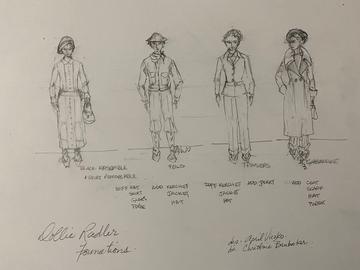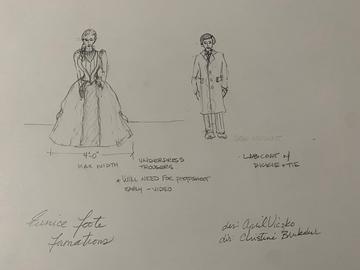March 25, 2022
Interdisciplinary collaboration shines theatre spotlight on four female scientists

The lives and scientific achievements of four women are about to take centre stage — literally — at the University of Calgary.
In a unique interdisciplinary collaboration, a researcher in the Faculty of Science has teamed up with faculty in Drama in the School of Creative and Performing Arts in the Faculty of Arts to create Formations, a theatrical performance that premieres on campus next week.
Formations weaves together science, drama, history and social issues to explore the lives of four under-recognized female scientists and their discoveries, how the role of gender influenced their careers and how history recorded them — or forgot them.
The idea for the play started with Dr. Glenn Dolphin, PhD, Tamaratt Teaching Professor in the Department of Geoscience, who uses the history, philosophy and sociology of science to teach students about geoscience in innovative ways.
Dolphin also has used drama within his classroom, getting students to perform a mini-play to learn about a controversy in the history of geology — the age of the Earth. He says:
Humans are hard-wired as storytellers. That’s how we pass knowledge to the next generation.
Research has shown that women and other under-served populations in science don’t come into science or leave science because the way it’s taught doesn’t have a humanistic approach, Dolphin says.
To ensure historical accuracy for Formations, Dolphin worked with historian colleagues. “It was really important for me to not just make a story that tugs at the heart strings or is super funny, it needs to be faithful to the science and to the history,” he says.
He also wanted a professionally produced play. So he took his idea to April Viczko, associate professor in the School of Creative and Performing Arts - Drama.
First collaboration of its kind
“This is the first collaboration of its kind with the Faculty of Science that I know of,” Viczko says. The idea offered a great opportunity to create a new play while training students in acting, design and other aspects of theatre, she says.
“Storytelling is natural to us in Drama. It is our method, part of our culture,” she adds.
Formations experiments with the form and technical approaches to theatre. For example, the one-act play uses projection techniques, wearable technology (a dress that lights up) and new software.
The play’s title connects to the geology-focused research of the four women scientists and how their passion for science shaped their lives. They are:
- Marie Tharp (1920-2006), a pioneering geologist and oceanographic cartographer who helped create the first scientific map of the Atlantic Ocean floor
- Eunice Foote (1819-1898), the first scientist to show that carbon dioxide in the atmosphere would cause warming
- Dollie Radler Hall (1897-1995), the first to discover oil deposits using seismic energy
- Florence Bascom (1862-1945), considered to be the “first woman geologist in America,” the first woman to work for the U.S. Geological Survey and who taught the next generation of women geologists
Formations provides students with learning experience
Formations invites the audience into the stories of the four women, including the challenges they faced in pursuing science, Dolphin says. Tharp, for example, became a cartographer working with sonar data because women were excluded from working aboard ships.
But any messages within the play are presented through a humanizing lens and with humour (famed ocean explorer Jacques Cousteau makes a comical appearance, for example), Viczko says. “There are some really funny issues that connect to how we live today and how women in science function today.”
Formations was written by Canadian playwright Meg Braem, an alumnus of UCalgary’s School of Creative and Performing Arts which offers a master’s degree in playwrighting. The play’s director is Christine Brubaker, associate professor and the chair of drama. Viczko is the theatre designer, responsible for the set, visual projections, lighting and costume design.
The actors who play the four women are all students. In addition, the play has two student designers working with Viczko, a student dramaturge, and a student crew.
Like Dolphin in Geoscience, the School of Creative and Performing Arts uses drama to teach, Viczko notes. “Our students go out into the world with that training, to professionally create theatre.”
First performances March 28 and 29
The first-ever performances of Formations before a live audience, presented as part of the ALCHEMY Festival of Student Work, are on Monday, March 28 at 8 p.m. and Tuesday, March 29 at 7 p.m. in the University Theatre. Tickets are available online.
Dolphin says he hopes the play sparks some appreciation for who these four women were and the challenges they faced. “Another takeaway is that scientists are human, so anyone could be a scientist.”
Viczko says she hopes the audience “will take away a sense of wonder and curiosity. I really hope that they leave going ‘Wow!’ and want to know more.”
Formations also will be performed this summer at the International History and Philosophy of Science and Science Teaching Group’s biennial conference, July 3 to 7 at the University of Calgary. Dolphin is the conference chair.
There’ll be another performance of Formations at the World Stage Design 2022 conference, Aug. 6 to 16 at the University of Calgary. Viczko is the project lead for the festival and exhibition of theatre designs.
The creation and performances of Formations received funding from the Office of the Vice-President (Research), the Faculty of Arts and the Tamaratt Teaching Professorship, an endowed research chair.









